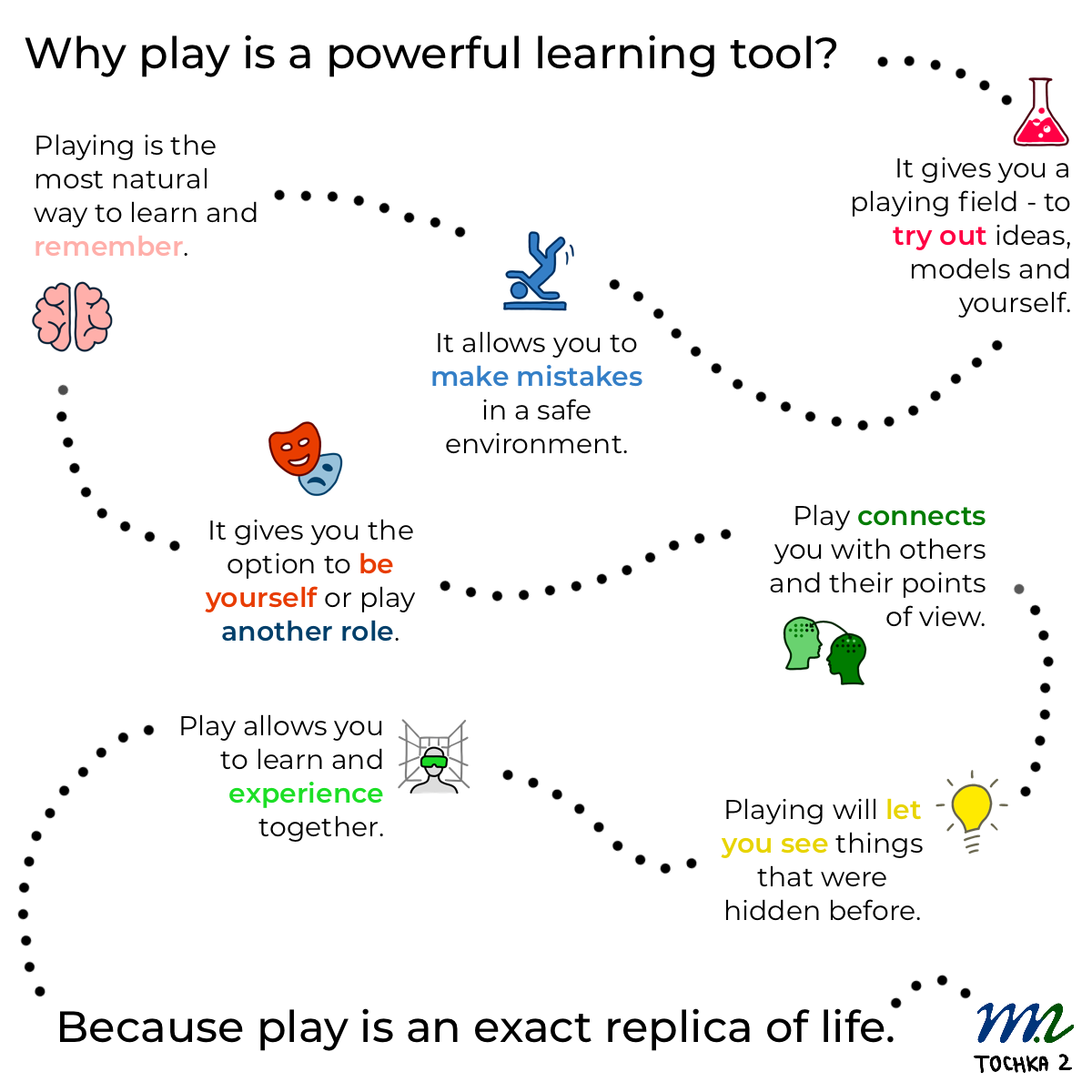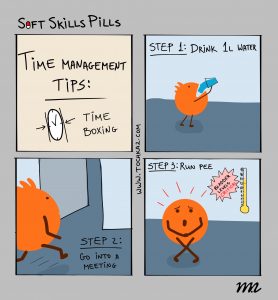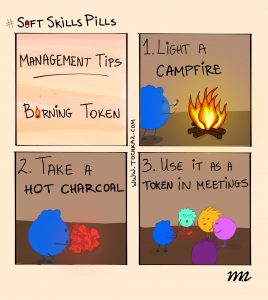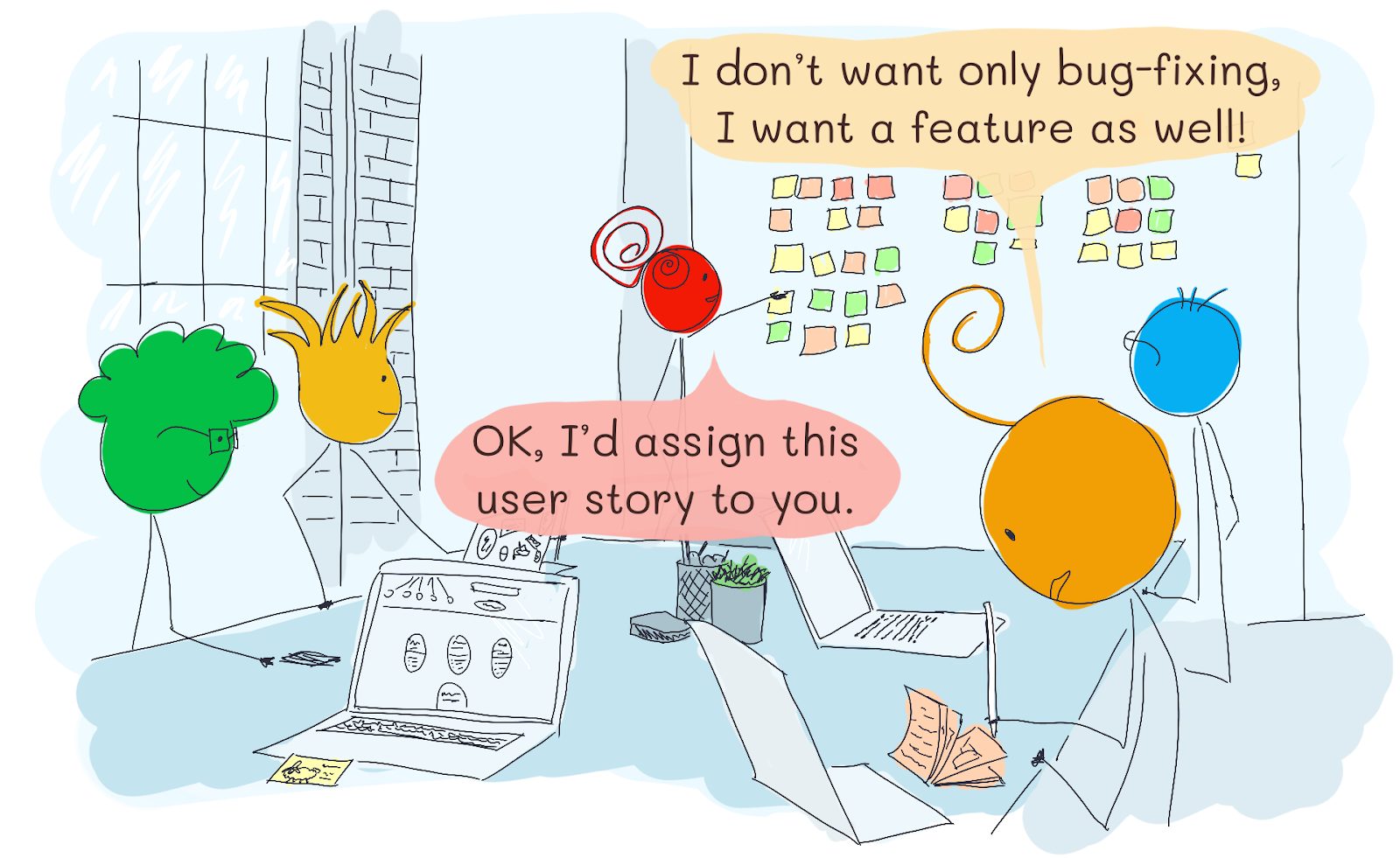Play To Learn: Soft Skills For IT People

Hari Haralambiev is a guy passionate about helping people work better together and create really strong teams. He is an ex- software developer turned into a soft skills trainer. He is a co-founder of Tochka 2 and SoftSkillsPills.com. He loves painting digitally and is the author of the leadership webcomic “A Leader’s Tale”.
– “Playing a game!?” – he said with disbelief to the trainers and just sat on a chair.
The rest of the team started frantically discussing how to solve the problem at hand. They brainstormed ideas, argued, prototyped. He was still sitting impartially. Yet, from time to time, he was taking glances at the others who were working hard to win the game. At some point, the disengagement transformed into annoyance. He couldn’t believe what the others were doing.
He stood up and started playing…
The power of play
The desire to play is something humans and other animals are born with. It’s tightly related to our inner drive for solving puzzles, as Daniel Pink explains it in his book Drive: The Surprising Truth about what motivates us. When playing, we don’t need any external incentives. We enjoy what we do.
In this post, I am going to share with you our experience surrounding play and why it matters. Play boosts motivation, positive emotions, and learning. Although some adults would argue otherwise, play is a learning tool beyond child development.
“We don’t stop playing because we grow old; we grow old because we stop playing.”
– George Bernard Shaw
Four years ago, when I co-founded Tochka 2, we chose to use games as a building block for our live training modules. We focused on developing soft skills for IT people and teams. At the time, there was a lot of movement about gamification in the learning industry. Mixing theory with practice and fun. Our approach was also mixing those elements, but we believed in play even further. We believed and still do that playing and practicing should happen in the beginning. First is experiencing real-like scenarios and afterward – analyzing, improving, and deep-diving into working models and approaches.
But why are games so important to us?

More than 2000 people from more than 35 IT companies echoed back and practically validated this approach. So, let’s share a few anecdotes that show the power of play:
The demotivated senior manager
“Is this the way we integrate people in our teams?!” – said one puzzled senior manager during a game.
The game is a simulation of project development (using LEGO pieces) and explores different topics such as teamwork, organization of work, leadership, people management, etc. In the beginning of the game, this manager chose a role, quite opposite to what he usually does – as a junior developer in the team. What happened next was that for half of the game nobody guided or even cared what he was doing. He was just sitting and not doing any meaningful work.
Learning is often connected with time – the more time you invest, the better you become. Sometimes, however, you don’t need much time. This is when you are knowledgeable on a topic but you have blind spots. No matter how much time you invest, it won’t work until something brings you awareness of those blind spots.
In an example at Google, as depicted in Adam Grant’s book Originals, a Yale professor was asked to help enrich the jobs of employees in sales and administrative positions, who didn’t perceive they have the same freedoms as the company engineers working on moon-shot projects. Several months after the training had finished, people rated higher on happiness and performance. What triggered this was a 90-minute workshop that unlocked people’s mindset.
The senior manager in our example was able to see his blind spots because he could easily choose a different role from real life. The 3-hour game gave him a different perspective.
The people who didn’t know what they were doing
A few months after experiencing one of our team games, you could hear people using the phrase “Do we know what we are doing?” during their team meetings.
This phrase came up during the game when we, the trainers, focused their attention on one common communication issue which was happening. The team had to solve a puzzle by choosing a strategy and then follow this strategy. However, a few people did not understand what was agreed and furthermore, they were not opening up about it. After realizing this, the team introduced the phrase at the end of each discussion. This was their mechanism to bring any uncertainties to the surface and clarify them.
Learning a new concept during training is one thing, but applying it to real-life situations is totally different. One of the reasons for this is the fear of failure. If you picture a baby or child developing any skill, you’ll often picture a lot of mistakes. It’s natural for humans to learn through mistakes. However, as we become older, our resistance to trying new things and make mistakes grows. Effective training lowers this resistance.
What happens during play is that people practice in a safe environment. They make mistakes, but the fear of negative outcomes is close to the minimum. The game allows them to try an approach and see for themselves if it’s working. In our case, the team saw it working, so there were fewer barriers to trying it directly in their daily conversations.
The loudest training
“Guys, could you be quieter?” – said another trainer, who had training in the next room.
The noise that was coming from our room was interrupting the flow of the other training.
On one hand, we felt uncomfortable that our game was an issue. On the other hand, we were sincerely happy because people were laughing, arguing passionately, engaging fully.
But why were we so happy?
Trainers all over the world have one common challenge – how to handle the forgetting curve, i.e. how to make sure people are able to recall and apply what they learned as distant in the future as possible. Research from Hermann Ebbinghaus, a psychologist who pioneered work in memory in the late 19th century, revealed that two-thirds of what we learn is forgotten by the end of the day and 80% – by the end of the month.
Numerous studies have shown the connection between emotions and memory. When we are playing, we are constantly experiencing different positive and negative emotions, which strengthens the memory.
In our loudest training, ten people were making a noise that echoed outside of а room that’s big enough to gather a hundred. Three months after the training people vividly remembered their experience and the theoretical models. All because of a game.
In our experience, play creates this sandbox, a safe environment, where people could experiment, make mistakes, and have fun. As a result, they learn and improve their skills.
Soft Skills Pills: Bringing Soft Skills Trainings Online
After the positive experience we had with the live training services, we decided it’s time for our small company to do its next major step – to build a product. When we co-founded Tochka 2 we wanted to help more IT people work better together. With the creation of our platform, Soft Skills Pills, our goal is similar, only on a larger scale.
With the platform, we want to give more options to IT people to develop their communication and leadership skills. To build stronger IT teams. Without waiting for their companies to organize formal training. A place where you not only consume theoretical information but practice it.
We kept the five main elements of our success formula:
- Interesting – have fun while learning
- Easy – have a simple, focused and clear learning experience
- Practical – to be able to practice what you learn and this to be easily applied in the real world
- Human – have an informal and friendly learning environment
- Quality – to use proven working models and to have an enjoyable experience
The name “Soft Skills Pills” was initially born out of frustration that we, as humans, tend to want quick fixes to our problems. We created a few comics that explored the idea with a bit of humor.


Later on, we loved the metaphor so much that we bought the SoftSkillsPills.com domain name, more than a year before we actually started building something.
Learn through “pills”
We launched the platform on Jun 1st, the day we celebrate Children’s Day in Bulgaria, a day people tend to play more. We released three pills that could be “taken” freely.
The pills are an interactive way to learn using this platform. You can take the pills in different ways: on your own, with a buddy or together with the whole team. The pills are quick to consume. Each targets a specific problem or topic.

Anxiety Party is a workshop for expressing work anxieties and getting feedback from the rest of the team. As a result, trust is increased and the team climate is improved.
Giving Feedback allows people to practice their feedback skills. All you need is a buddy to play.
Lost in Translation is a single-player game that focuses on our listening skills by exploring the four-ears model in real-life scenarios.
Still sitting on a chair without participating?
Finally, I would love it if with this post more people start seeing play from a different perspective – not as a way to have fun or kill time. I hope we all play to learn.




























